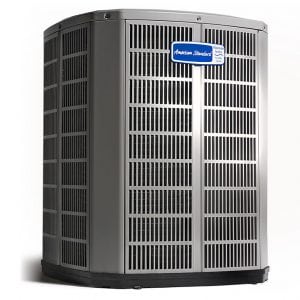By today's standards, there is a pretty good chance your air conditioner is inefficient and could even be oversized if it is more than 10 years old. With a new energy efficient air conditioning unit, you will most likely improve comfort, lower your energy bills and even reduce your environmental impact by replacing an old air conditioner.
Improve Your Comfort Level
You should consider replacing your air conditioning system if it is making a loud noise or no longer cools your house. If your home feels humid, your system may be inefficiently oversized or no longer working as it should. These changes with your ac system or problems could require major repairs which might rival the cost of a new unit, particularly when you consider your potential savings on energy bills.
Energy Savings Can Be Significant Over Time
In order to estimate your potential savings, look for the SEER (Seasonal Energy Efficiency Ratio) number on your current Air Conditioning unit. If your current unit is 10 or below, you should really consider a total replacement.
The SEER rating is the number of BTUs of cooling energy per watt-hour of electricity. Prior to 2006, air conditioners were required to have a minimum SEER rating of 10. Today, central air conditioners must have a minimum SEER rating of 13, and EnergyStar-labeled air conditioners must be rated at least 14. The most efficient models have SEER ratings up to 26.

The difference in annual operating cost between SEER 10 and SEER 13 air conditioners is substantial. Although costs can vary, the average family in Youngsville, LA can expect to pay $645 per year to cool a home with an air conditioner rated at SEER 10. The same family could save $306 for a season of cooling with a SEER 16 air conditioner.
For a more specific estimate, click on this energy calculator. You can enter your local electricity costs and data for both an existing unit and a more efficient replacement to determine the potential life cycle savings and payback period for the new unit.
Environmental consideration
Older air conditioners use an ozone-depleting refrigerant. In 2010, the Environmental Protection Agency banned the manufacture of air conditioners with R-22. The chemical is still available for repair work on old units, but new air conditioners use refrigerants that are safer for the environment.
What to replace
Of course, the high cost of replacing the air conditioner is the major obstacle. High-efficiency systems with SEER ratings above 16 generally cost at least $3,500, but the full project could cost much more. To maximize efficiency, air conditioners should probably be replaced at the same time as the furnace. The heating and cooling systems typically share a blower motor, and an old, inefficient motor will reduce the efficiency of the new air conditioner.
As noted above, many homes have oversized air conditioners. If you have added insulation or otherwise made your home more energy efficient, you may be able to upgrade to a smaller replacement air conditioner.
When you are gathering estimates for replacement HVAC systems, reputable contractors should spend a significant amount of time in your home evaluating the size of your home, and your windows and insulation. They will also inspect the duct system, and measure air leaks to size up your needs.
Replacing an air conditioner can be a daunting expense, but it can improve comfort and significantly lower energy bills, making the cost worthwhile.